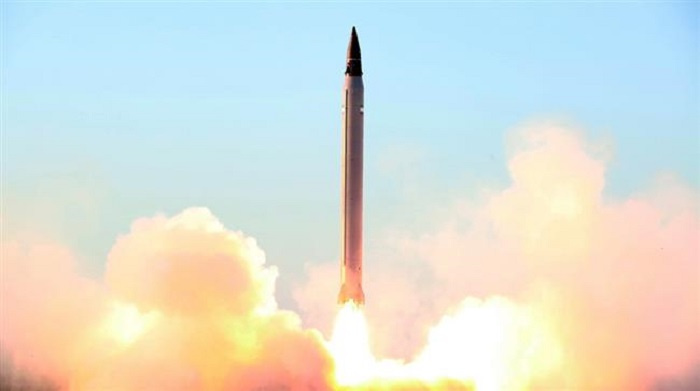US Delays Imposing New Sanctions after Iran Reaction

In a decree to Iran’s Defense Minister Brigadier General Hossein Dehghan on Thursday, Iranian President Hassan Rouhani ordered acceleration in Iran’s program for production of “various types of missiles” needed to improve the country’s defense capabilities, PressTV reported.
The decree came a day after a report by The Wall Street Journal that Washington is preparing sanctions against firms and individuals in Iran, Hong Kong and the United Arab Emirates over alleged links to Iran’s ballistic missile program.
Rouhani, in his decree to Dehghan, called the purported plan by the White House a measure in line with hostile US policies to “illegally interfere in the Islamic Republic of Iran’s programs for boosting the defense power.”
“In line with the [country’s] ratified defense policies, it is necessary that the program for the production of various types of missiles needed for the (Iranian) Armed Forces continue with more speed and seriousness,” Rouhani said.
The Iranian President also warned that in case the US repeats such “wrong and interventionist” measures, the Iranian Defense Ministry must develop a new plan for expanding the country’s missile capabilities.
He once again rejected claims that Iran is planning to produce missiles capable of carrying nuclear warheads, saying that Iran will continue to produce and test ballistic missiles as a “conventional and important” instrument for defending the country.
“It is clear that Iran’s missile program has never been part of the JCPOA, as [already] acknowledged by US officials,” said Rouhani, stressing that “nuclear weapons have no place in Iran’s defense doctrine; therefore, Iran’s ballistic missiles have not been designed to carry nuclear warheads.”
Earlier in the day, Iranian Foreign Ministry spokesman, Hossein Jaberi Ansari, also warned the US against imposing any fresh sanctions on Iran over the country’s ballistic missile program, saying Tehran will respond to such meddlesome measures.
“The Islamic Republic will respond to any meddlesome action against its defense program by strengthening its defense might,” Jaberi Ansari said, adding, “No measure can deny the Islamic Republic of Iran its legitimate and legal rights to boost its defense might and national security.”
Head of the Foreign Ministry Headquarters to Monitor the Joint Comprehensive Plan of Action (JCPOA) Abbas Araghchi also dismissed the claims that Iran has violated UN Resolution 1929 in a special news talk show on state TV last night, as quoted by state news agency, IRNA.
“It is understood that the American side seeks to disturb the JCPOA as they did their best in the past two years to stop the talks or prevent its success. Even after the negotiations, they did try not to let the JCPOA pass the Congress and strive to undermine a successful implementation of the deal,” the Iranian Deputy Foreign Minister said, answering a question regarding the hostile US approach adopted immediately after Iran shipped uranium out as part of the deal.
“The Zionist and regional lobbies play a significant role in US policies and we should not allow such an agenda to be prepared,” Araghchi added.
Iranian officials have said the Supreme Leader, Ayatollah Ali Khamenei, would view such penalties as violating the nuclear accord. Earlier on Thursday, Iranian Foreign Ministry spokesman Hossein Jaberi Ansari condemned the U.S. plans to impose additional sanctions as "arbitrary and illegal".
U.S. officials have said the Treasury Department retains a right under the nuclear deal to blacklist Iranian entities suspected of involvement in missile development.
Sources familiar with the situation had revealed on Wednesday that Washington is preparing new sanctions against international companies and individuals over Iran's testing of a medium-range Emad rocket on Oct. 10.
However, pressure by Iranian officials and media seem to have persuaded the US to think twice about imposing new sanctions. The White House has delayed imposing new financial sanctions on Iran over its ballistic-missile program, The Wall Street Journal reported on Thursday.
Interpretensions!
The escalating dispute centers on the types of missiles that the Islamic Republic is allowed to develop and whether they are capable of, or designed to, carry nuclear warheads.
A team of U.N. sanctions monitors said in a confidential report seen by Reuters on Dec. 15 that the Emad rocket tested by Iran was a ballistic missile capable of delivering a nuclear warhead, making it a violation of a U.N. Security Council resolution.
Ballistic tests by Iran are banned under Security Council Resolution 1929, which dates from 2010 and remains valid until the July nuclear deal between Iran and world powers goes into effect.
Once it does, Iran will still be "called upon" not to undertake any ballistic missiles work designed to deliver nuclear weapons for a period of up to eight years, according to a Security Council resolution adopted in July, right after the nuclear deal.
Iran says the resolution would ban only missiles "designed" to carry a nuclear warhead, not "capable of" carrying one, so it would not affect its military program as Tehran does not pursue nuclear weapons. Iran has called Emad a conventional missile.
While both sides still hope, at least apparently, to implement the JCPOA, the whole deal is still jeopardized by misunderstanding.
Zarif’s New Year wish tweet is perhaps the only way to wrap up the situation in less than 140 characters.
"Much was achieved in 2015 through diplomacy—let’s learn from history and repeat successes, not past mistakes. A Happy New Year to all."

